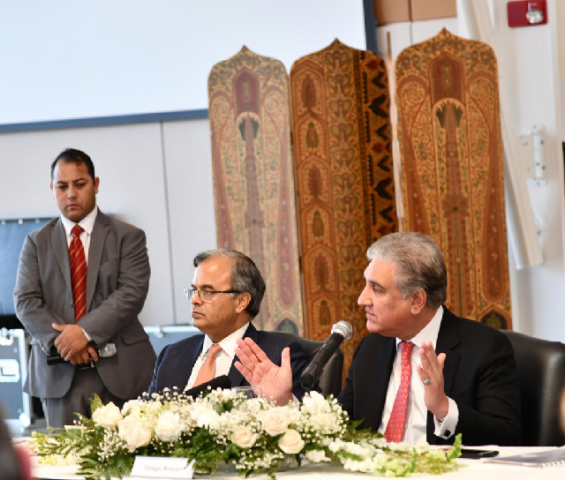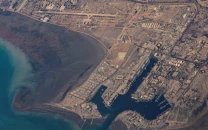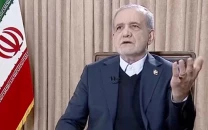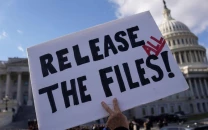FM urges US to ‘change lens’ to see plight of Indian minorities
Qureshi says Iran wants to de-escalate, reaches Doha for talks with Qatari counterpart

Speaking to media persons at Pakistan’s Embassy in Washington, Qureshi, who has shuttled between Washington and Tehran this past week, voiced confidence on Friday that Iran was seeking to lower tension and was willing to engage in dialogue “at any level and in any format”.
The foreign minister concluded his three-day US visit on Saturday, during which he met with top US officials and raking lawmakers on the Middle East tensions, Afghanistan’s peace process as well as the situation in Indian Occupied Kashmir and bilateral relations.
Talking to reporters before his departure, the foreign minister invited diplomats from the United States to visit Pakistan and rejected India’s propaganda about the treatment of minorities in Azad Jammu and Kashmir (AJK).
FM Qureshi arrives in Qatar after 'fruitful' US visit
“Pakistan’s intentions are clear – to protect the minorities, to protect their rights. Are they [India] willing to give Muslims their rights,” he said. “We opened Kartarpur [Corridor], so Sikhs from all over the world can freely come and go.”
Since August 5, 2019 – when India unilaterally stripped occupied Kashmir of its special status by revoking Article 370 of its Constitution – New Delhi has continued to tighten restrictions in the region and has imposed a draconian communication blackout.
“In [Occupied] Kashmir, Friday prayers are not allowed but our side, come and look at their Mandirs [Hindu temples]. Is there any hindrance? Is there any hindrance in people’s homes? There’s nothing [wrong] from our side and there shouldn’t be.”
The Indian parliament on Dec 4 passed the controversial Citizenship Amendment Act (CAA), allowing fast-track citizenship to non-Muslims from neighbouring Muslim countries, in the latest push by far-right BJP-led government to redefine India as a Hindu state.
Referring to the divisive legislation that was enacted this month, the foreign minister asked why the US cannot see the evident discrimination against Muslims by the right-wing government led by Prime Minister Narendra Modi.
“If Hindus, Sikhs and Jains can receive citizenship, then why can’t Muslims? [if they have their documents],” he questioned.
Qureshi spoke to the media after meeting Secretary of State Mike Pompeo and National Security Adviser Robert O’Brien at the White House – five days after seeing Iranian President Hassan Rouhani. He underscored Pakistan’s willingness to play its role in defusing tensions in the Persian Gulf.
Qureshi stopped short of saying that he has transmitted any message to them but said he understood that the Iranians “did not want to escalate things”, adding: “They don’t want war, they don’t want further bloodshed.”
The US on January 3 killed Iran's most powerful general, Qassem Suleimani, in a drone strike in Baghdad. Iran responded with missile strikes on US forces in Iraq but Qureshi believes the reprisal was designed to cause minimum casualties.
Without naming Saudi Arabia, Qureshi said the Iranian leadership signalled a willingness to ease tensions with its Arab neighbours.
The Iranians "highlighted the issues, the differences, they have had with other important countries in the region," he said. "They said they are willing to engage at any level and in any format."
Responsible Afghan withdrawal Secretary of State Pompeo said he had enjoyed meeting Qureshi. “We discussed countering Iranian aggression, the Afghan peace process, trade ties, and regional stability,” Pompeo wrote in a Twitter post.
Separately, in an interview with American broadcaster Fox News, Qureshi stressed the need for withdrawal of the US troop from Afghanistan in a responsible manner to avoid a repeat of the mistakes from the past.
“Pakistan is asking [the US] for a responsible withdrawal unlike the ’80s, which created a vacuum for the destructive forces to take over,” he said after being asked about the US involvement in the Soviet-Afghan war.
Responding to another question about the Afghan peace process, Qureshi said Pakistan facilitated a US dialogue with the Taliban on the request of President Donald Trump in the hope for peace and stability in the region.
“The Taliban are speaking to the US today and there is a possibility of an agreement,” he said, mentioning about Thursday’s announcement by the Taliban of a ceasefire of seven to 10 before they could take next step leading to dialogue.
After concluding his US trip, Foreign Minister Qureshi arrived in the Qatari capital Saturday evening, where he was scheduled to meet his Qatari counterpart, Mohammed bin Abdulrahman Al Thani before heading home.






1721969212-0/BeFunky-collage]-(35)1721969212-0-208x130.webp)












COMMENTS
Comments are moderated and generally will be posted if they are on-topic and not abusive.
For more information, please see our Comments FAQ